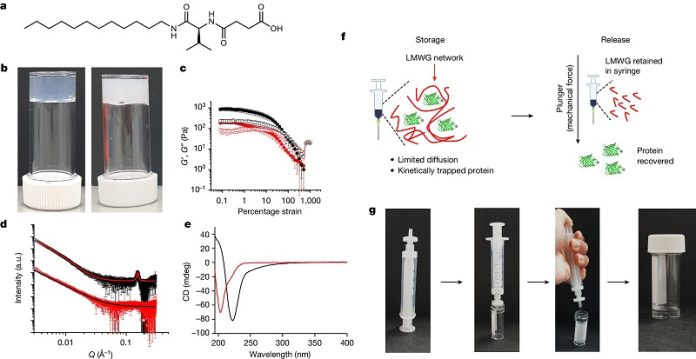
Scientists have developed a groundbreaking method to store and transport vital medicines without the need for fridges or freezers.
This innovative approach could dramatically improve the accessibility of essential protein-based drugs, especially in developing countries where cold storage is often unavailable.
The research, conducted by teams from the Universities of Manchester, Glasgow, and Warwick, was published in the journal Nature.
The new method involves a special material called a hydrogel, which is mostly made of water. This hydrogel can stabilize proteins, keeping them effective even at temperatures as high as 50°C.
This stability means that medicines can be sent through the mail without losing their effectiveness, making it easier and cheaper to get these vital treatments to patients and clinics.
Protein-based medicines are used to treat many conditions, including cancer, diabetes, and obesity.
However, these medicines usually need to be kept cold to prevent them from deteriorating, which requires a lot of energy and limits their distribution in places without reliable refrigeration.
The hydrogel works by trapping proteins in a network of fibers, which prevents them from mixing and losing their effectiveness. The hydrogel is built from a material called a low molecular weight gelator (LMWG).
When proteins are added to the hydrogel, they become trapped in the spaces between the fibers, protecting them from heat and movement.
Dave Adams, a professor at the University of Glasgow and one of the study’s authors, explained, “In the early days of the COVID vaccine rollout, there was a lot of attention on the challenges of transporting and storing vaccines.
Our technology marks a significant advance in overcoming these challenges, making it possible to deliver therapeutic proteins without the need for careful handling and temperature management.”
The hydrogel’s unique properties make it easy to release the proteins when needed. The gel is stored in a syringe fitted with a special filter.
When the plunger is pressed, the network of fibers breaks, releasing the protein. The protein passes through the filter and out the syringe tip, leaving the gel behind.
“Our breakthrough allows us to store and distribute proteins at room temperature, free from any additives,” said Professor Matthew Gibson from the University of Manchester, another author of the study.
In their tests, the researchers demonstrated how the hydrogel works with two valuable proteins: insulin, used to treat diabetes, and beta-galactosidase, an enzyme with many applications in biotechnology.
They found that insulin stored in the hydrogel remained effective even after being warmed to 25°C and subjected to vigorous shaking. Similarly, beta-galactosidase retained 97% of its function after being stored at 50°C for seven days.
The team also tested the hydrogel’s ability to protect proteins during postal transport. Samples of proteins suspended in the hydrogel were mailed, and after two days in transit, the proteins were still intact and effective.
Gibson highlighted the significance of this discovery, saying, “Delivering and storing proteins intact is crucial for many areas of biotechnology, diagnostics, and therapies.
Our breakthrough eliminates the need for cold storage and allows us to store and distribute proteins at room temperature, which is a really exciting prospect.”
The researchers are now exploring commercial opportunities for this patent-pending technology and further demonstrating its applicability.
Collaborators from the University of East Anglia and Diamond Light Source Ltd also contributed to the research.



